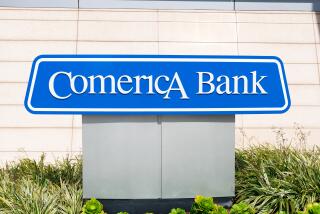Cash Crisis for Rhode Island Savers : Banking: The closure of 45 financial institutions in the state leaves many consumers wondering how they’ll pay their bills.
- Share via
PROVIDENCE, R.I. — One day after Gov. Bruce Sundlun declared a bank emergency that shut 45 financial institutions in this state, there was a mood of anger and frustration among depositors who could not get to their cash.
“I’m totally devastated,” said Sabrina Weston, standing outside the East Providence Credit Union. “I have no money. I have bills to pay. I am at a loss for what to do.”
Sundlun’s action came just hours after he was sworn into office Tuesday. The 35 credit unions and 10 banks covered by his shutdown order together have about 300,000 accounts worth $1.7 billion in a state with just over 1 million residents.
All of the affected financial institutions were covered by a private insurance fund, the Rhode Island Share & Indemnity Corp. (RISDIC). But RISDIC’s reserves have been nearly depleted by an insolvent institution, Heritage Loan & Investment Co. of Providence. Heritage’s president, Joseph Mollicone Jr., has been charged with embezzling $13 million.
After a board meeting Monday, RISDIC asked the state to put it into conservatorship--a step that essentially put the fund out of business and the institutions it insured in jeopardy. By law in Rhode Island, financial institutions must have deposit insurance.
At a news conference Wednesday, Sundlun announced that seven of the credit unions would reopen Monday and 15 more shortly after. But the future of the remaining credit unions--including the largest in the state--remained in doubt, and the fate of the closed banks depends on a review by the Federal Deposit Insurance Corp. that won’t be completed before Jan. 8.
Meanwhile, state troopers were posted at the doors of the closed banks and credit unions; a level of confusion was apparent within.
At Greater Providence Deposit & Trust Co., in the business district of the state capital, one sign in the window told customers to “please use the revolving door,” while another announced that the bank was “closed until further notice by the governor of Rhode Island.”
Inside the building--resplendent with its green and gold rococo ceiling and marble floors--a teller was stationed behind the counter. But no customers were permitted inside the bank.
In nearby Cranston, R.I., Paul O’Neil was waiting outside the shut Columbia Credit Union. “I’m flat broke,” said O’Neil, a heavyset man in his 40s. “I’ve only got $4.”
William Sweeney, a professor of economics at Bryant College in Smithfield, R.I., called the bank emergency “scary” and “distressful.”
“The individual depositors are innocent and caught in the middle” of the banking crisis, he lamented. “The main point is that the banks and credit unions need to be assessed--evaluated and audited--so we know what we are up against.”
Those words were probably an understatement to Evelyn Shrilling. The gray-haired woman was in a group outside the East Providence Credit Union.
“I heard about it on TV this morning,” Shrilling said. “It blew my mind. How are you going to pay your bills? How are you going to manage?”
Jean Plunkett, the feature editor of the Providence Journal/Bulletin newspaper, also expressed concern over the closing of her paper’s credit union. Plunkett says she uses the credit union account to cover private-school tuition for her 13-year-old daughter, Annie.
“I had just written the last check for Annie’s tuition, and I got nervous,” Plunkett said. She said she called the credit union and was assured her check would clear.
W. Edward Wood, Sundlun’s chief of staff, compared the situation in Rhode Island to similar banking emergencies in Maryland and Ohio five years ago when those states’ governors were forced to close banks following the collapse of a private insurer.
The situation in Rhode Island, Wood said, also was grave enough to require immediate attention from the new governor. “Every prudent possible action,” he said, will be taken “to protect the depositors in these institutions.”
Not everyone, though, was in a rush for the banks and credit unions to reopen.
“All I’ve got is loans,” said Eric Widmer, the dean of admissions and financial aid of Brown University, who was outside the university credit union in Providence. “So I don’t have to worry too much.”
More to Read
Sign up for Essential California
The most important California stories and recommendations in your inbox every morning.
You may occasionally receive promotional content from the Los Angeles Times.












